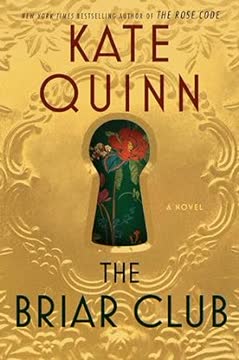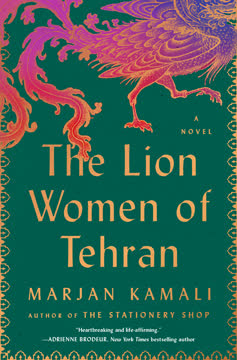Plot Summary
Across the Sea Divide
In 1940, as bombs threaten London, eleven-year-old Beatrix Thompson is sent by her anguished parents, Reginald and Millie, across the Atlantic to safety in America. The wrenching separation is marked by guilt, anger, and the hope that distance will keep her safe. Beatrix's arrival in Boston is disorienting; she is greeted by the Gregory family—Ethan, Nancy, and their sons William and Gerald—who welcome her into their privileged, sunlit world. The ocean becomes both a literal and emotional barrier, separating Beatrix from her past and forcing her to adapt to a new life, language, and set of expectations. The trauma of exile lingers, shaping her sense of self and belonging as she tries to reconcile the girl she was with the one she must become.
A New Family's Embrace
Beatrix is enveloped by the Gregorys' routines and affections, their home a world of abundance and order so unlike her own. Nancy, eager for a daughter, showers her with care, while Ethan remains reserved, unsure how to parent a girl. The Gregory boys, William and Gerald, become her companions and rivals, each forging a unique bond with her. The family's summer retreat in Maine, with its wild beauty and rituals, offers Beatrix moments of joy and belonging, but also underscores her outsider status. Through shared meals, birthday celebrations, and the rhythms of American life, Beatrix is both comforted and reminded of all she has lost. The Gregorys' love is genuine, but it cannot erase the ache of absence or the knowledge that this is not truly her home.
Letters Between Two Worlds
Letters, Rituals, and Objects become Beatrix's lifeline, connecting her to her parents and the world she left behind. Each missive is a careful construction, omitting hardships and emphasizing small triumphs, as both sides try to protect each other from pain. The letters are filled with longing, misunderstandings, and the slow erosion of intimacy as time and experience widen the gulf between Beatrix and her parents. She struggles to express the colors and flavors of her new life, while her parents' news grows increasingly abstract. The act of writing and reading becomes a ritual of hope and grief, a way to keep love alive across the sea, even as memories fade and new attachments form.
Becoming American, Becoming Other
As the years pass, Beatrix adapts to American customs, language, and expectations. She excels in school, makes friends, and learns to swim and row, gradually becoming more at ease in her adopted family. Yet, this transformation comes at a cost: her Britishness becomes a performance, her memories of home blur, and she feels increasingly unmoored. The Gregorys' world is seductive but also alien, and Beatrix is haunted by the knowledge that her presence is temporary. The war's end, when it comes, is both a relief and a threat, signaling the eventual return to a home that no longer exists as she remembers it. The process of becoming American is both liberation and loss, shaping her identity in ways she cannot yet understand.
War's Shadow and Summer Light
The war's presence is felt in rationing, air raid drills, and the constant anxiety of news from abroad. Yet, in the Gregorys' Maine summers, the children find freedom and adventure—swimming, exploring, and forging bonds that transcend nationality. The island becomes a sanctuary, a place where the world's troubles recede and Beatrix can imagine a future unburdened by fear. The children's games and rivalries are tinged with the knowledge that nothing lasts forever. The war's end brings celebration but also uncertainty, as the question of Beatrix's return looms. The light of summer is always shadowed by the knowledge of impending change.
Bonds Forged, Bonds Strained
Beatrix's relationships with William and Gerald deepen and complicate as they move through adolescence. William, restless and ambitious, becomes both confidant and object of longing, while Gerald's steadfast affection offers comfort and stability. The Gregory parents, too, are changed by Beatrix's presence—Nancy's maternal dreams are fulfilled and then threatened by the prospect of loss, while Ethan's reserve masks a growing attachment. The bonds between the children are tested by jealousy, secrets, and the knowledge that Beatrix's time with them is finite. The approach of adulthood brings new tensions, as each must navigate the pull of family, love, and the desire for independence.
Losses and Longing
The war claims its toll: Beatrix's father dies suddenly, and she is unable to return for the funeral, her grief compounded by distance and helplessness. The Gregorys, too, face loss as Ethan dies, leaving Nancy and the boys adrift. The families, once so closely linked, begin to drift apart, their connections maintained only through sporadic letters and memories. Beatrix's return to England is fraught with disappointment—her mother has remarried, their old home is gone, and she is a stranger in her own country. The longing for what was, and the pain of what can never be again, haunt all the characters as they try to rebuild their lives in the aftermath of war and loss.
The War Ends, So Does Childhood
When Beatrix finally returns to London, she finds that nothing is as she left it. Her mother's new life is alien, her own childhood room gone, and the city itself transformed by war and time. The Gregorys, too, must adjust to her absence, their family forever altered by her presence and departure. The bonds forged in childhood are tested by distance, change, and the demands of adult life. Letters become less frequent, memories more fragile. The end of the war marks the end of innocence, as each character must confront the realities of adulthood, loss, and the search for meaning in a changed world.
Return and Disconnection
Years later, William and Beatrix are briefly reunited in London after the death of Ethan. Their meeting is charged with nostalgia, regret, and the realization that the past cannot be reclaimed. Both are changed—William is married, a father, and burdened by disappointment; Beatrix is independent but lonely, her life shaped by absence and adaptation. Their connection is undeniable but ultimately unfulfilling, a reminder of what might have been. The encounter leaves both unsettled, forced to reckon with the choices they have made and the lives they have built apart.
Love, Memory, and Distance
As the years pass, the characters' lives diverge but remain subtly intertwined. Gerald and Beatrix maintain a steady correspondence, their friendship deepening into something more. Nancy, Millie, and Rose each grapple with aging, loneliness, and the legacies of love and loss. The memory of William—his charm, restlessness, and longing—haunts those who loved him, shaping their relationships and choices. The island in Maine, once a symbol of childhood freedom, becomes a touchstone for memory and the possibility of renewal. The past is never truly past; it lives on in the stories, rituals, and affections that bind the characters together.
The Ties That Remain
In the wake of William's death, the Gregory and Thompson families come together to mourn, remember, and find solace in each other. Beatrix returns to America, reconnecting with Gerald and Nancy, and forging new bonds with William's children. The process of grieving is also one of healing, as old wounds are acknowledged and new connections formed. The characters learn to forgive themselves and each other for the failures and betrayals of the past, recognizing that love endures even as circumstances change. The act of coming together—around a table, on the island, in letters—becomes an affirmation of the ties that remain.
Generations and Homecoming
Gerald and Beatrix, now partners, reclaim the island in Maine, restoring it as a place of gathering and memory. The next generation—William's children, Beatrix and Gerald's daughter—find their own place in this landscape, inheriting the stories and traditions of those who came before. The island becomes a symbol of continuity and renewal, a place where the past is honored and the future imagined. The characters, having weathered loss and change, find peace in the knowledge that home is not a place but a web of relationships, memories, and shared hopes.
Letting Go, Holding On
In the final years, the characters reflect on the arc of their lives—their loves, losses, and the choices that shaped them. Nancy, Millie, and Rose each find contentment in their own ways, letting go of old grievances and embracing the joys of the present. Beatrix and Gerald, surrounded by family and friends, understand that the true legacy of their journey is not survival, but the capacity to love and be loved. The island, once a refuge from war, becomes a sanctuary of belonging, a place where the boundaries between past and present, self and other, are gently dissolved.
The Island's Promise
On the island, the generations gather—children, grandchildren, friends old and new. The rituals of summer—swimming, baking, storytelling—are renewed, and the ghosts of the past are welcomed as part of the living fabric of the family. The island, once a place of exile and longing, is now a home reclaimed and remade. The characters, having traversed oceans and decades, find themselves at peace, grateful for the journey that brought them together. The promise of the island is not escape, but the enduring possibility of connection, forgiveness, and joy.
What's Past Is Prologue
As the story closes, the characters look back on the arc of their lives with gratitude and acceptance. The losses and separations that once seemed insurmountable are now understood as part of a larger tapestry—a story of resilience, love, and the search for belonging. The island stands as a testament to the power of memory and the possibility of renewal. The past is not a prison, but a prologue—a foundation on which new stories can be built. The final image is one of hope: the next generation, swimming in the sea, carrying forward the lessons and loves of those who came before.
Characters
Beatrix Thompson
Beatrix is the emotional heart of the novel—a child uprooted by war, forced to navigate the complexities of loss, adaptation, and identity. Her journey from frightened evacuee to beloved daughter, friend, and eventually partner is marked by resilience, longing, and a deep capacity for love. Psychoanalytically, Beatrix embodies the trauma of displacement and the struggle to reconcile competing loyalties. Her relationships—with her parents, the Gregorys, William, and Gerald—are shaped by both gratitude and grief. Over time, she learns to accept the impossibility of returning to a lost past, finding instead a sense of home in the bonds she forges and the memories she carries. Her development is a testament to the power of connection and the necessity of letting go.
William Gregory
William is both Beatrix's counterpart and foil—a charismatic, ambitious, and ultimately restless soul. His relationship with Beatrix is charged with longing, rivalry, and unfulfilled possibility. William's inability to find contentment, his yearning for escape, and his struggles with family expectations reflect the psychological costs of war, privilege, and masculinity. As he moves from golden boy to disillusioned adult, William's choices reverberate through the lives of those who love him. His death is both a rupture and a release, forcing the other characters to confront their own regrets and hopes. William's legacy is one of both loss and inspiration, a reminder of the fragility and beauty of connection.
Gerald Gregory
Gerald is the novel's quiet anchor—a sensitive, loyal, and compassionate presence. Overshadowed by his brother, he finds in Beatrix a kindred spirit and, eventually, a partner. Gerald's journey is one of self-discovery, as he moves from the margins of his family to a place of leadership and fulfillment. His work as a counselor and educator reflects his deep empathy and desire to mend what is broken. Gerald's relationship with Beatrix is marked by patience, understanding, and a willingness to embrace the complexities of love and loss. He represents the possibility of healing, the importance of chosen family, and the enduring power of kindness.
Nancy Gregory
Nancy is the emotional center of the Gregory family—a woman whose longing for a daughter is fulfilled and then threatened by Beatrix's presence. Her warmth, generosity, and capacity for forgiveness are tested by loss, disappointment, and the demands of motherhood. Nancy's psychoanalytic arc is one of adaptation: she learns to let go of control, to accept change, and to find meaning in the bonds that remain. Her relationship with Beatrix is both maternal and fraught, shaped by the knowledge that love cannot prevent loss. In her later years, Nancy becomes a keeper of stories, ensuring that the family's legacy endures.
Ethan Gregory
Ethan is a man of principle and restraint, more comfortable with ideas than emotions. His initial distance from Beatrix gives way to a quiet affection, expressed through shared rituals and understated gestures. Ethan's struggles with fatherhood, marriage, and mortality reflect the challenges of a generation marked by war and duty. His death leaves a void that the family must learn to fill, and his memory becomes a touchstone for those who seek guidance and comfort. Ethan's legacy is one of integrity, patience, and the quiet strength that underpins the family's survival.
Millie Thompson
Millie is defined by loss—of her husband, her daughter, and the life she imagined. Her decision to send Beatrix away is both an act of love and a source of enduring guilt. Millie's relationships are marked by ambivalence, as she struggles to forgive herself and to accept the choices of those she loves. Her remarriages, her evolving bond with Beatrix, and her eventual acceptance of her own limitations reflect a journey toward self-compassion. Millie's arc is one of reconciliation, as she learns to find joy in the present and to let go of the past.
Reginald Thompson
Reginald's insistence on sending Beatrix to America is both pragmatic and tragic, setting in motion the novel's central conflicts. His own experiences of war, his sense of duty, and his inability to communicate vulnerability shape his relationships with Millie and Beatrix. Reginald's death is a turning point, forcing both women to confront their own grief and to redefine their sense of family. He represents the burdens of responsibility, the costs of silence, and the ways in which love can be both protective and wounding.
Rose Kelly Gregory
Rose, William's wife, is both a foil and a mirror to Beatrix. Her longing for glamour, her struggles with marriage and motherhood, and her eventual resilience reflect the challenges faced by women in a changing world. Rose's relationship with William is marked by disappointment and endurance, but she finds new purpose in work and friendship after his death. Her journey is one of adaptation, as she learns to balance memory and hope, loss and renewal.
Kathleen Gregory
Kathleen, William's daughter, embodies the novel's themes of continuity and change. Sensitive, intelligent, and searching, she inherits both the gifts and the wounds of her parents and their friends. Her relationships with Beatrix, Gerald, and her own brother Jack are shaped by the stories and rituals of the past. Kathleen's coming of age is a testament to the enduring power of love, the importance of belonging, and the possibility of forging new paths from old foundations.
The Island (Setting/Symbol)
The island in Maine is more than a setting—it is a character in its own right, embodying the novel's central themes of exile, homecoming, and the passage of time. It is a place of transformation, where childhood is both preserved and left behind, where grief is both endured and healed. The island's cycles of summer and winter, its rituals and landscapes, become a touchstone for the characters' journeys. It is a symbol of what is lost and what can be reclaimed, a reminder that home is not a place but a constellation of relationships and memories.
Plot Devices
Dual Family Structure and Parallel Narratives
The novel's structure alternates between the Thompsons in England and the Gregorys in America, using letters, shifting perspectives, and time jumps to explore the impact of war, exile, and reunion. This duality allows for a rich exploration of identity, belonging, and the ways in which love and loss reverberate across generations. The parallel narratives highlight both the similarities and differences in the characters' experiences, creating a tapestry of interconnected lives. The use of letters as a plot device bridges distance, reveals hidden emotions, and underscores the limitations of language and memory.
The Island as Symbol and Setting
The island in Maine functions as both a literal refuge and a metaphor for the characters' emotional journeys. It is a site of childhood innocence, adolescent longing, and adult reconciliation. The recurring motif of the island—its seasons, rituals, and landscapes—anchors the narrative and provides a space for healing and renewal. The act of returning to the island, reclaiming it, and passing it on to the next generation becomes a central plot device, symbolizing the possibility of homecoming and the endurance of love.
Time Jumps and Generational Shifts
The novel moves fluidly across decades, using time jumps to explore the long-term consequences of choices made in youth. The shifting focus from Beatrix's childhood to her adulthood, from the original families to their children and grandchildren, allows for a meditation on memory, legacy, and the ways in which the past shapes the present. The structure invites readers to consider not only what is lost, but what endures, and how each generation must find its own way to belong.
Letters, Rituals, and Objects
Letters, photographs, recipes, and cherished objects serve as tangible links between characters and across time. These plot devices ground the emotional arc of the story, providing moments of connection, misunderstanding, and revelation. Rituals—birthday celebrations, summer swims, shared meals—become acts of remembrance and renewal, reinforcing the bonds that survive separation and change. The careful attention to these details creates a sense of intimacy and authenticity, inviting readers to inhabit the characters' inner worlds.
Foreshadowing and Circularity
The novel employs foreshadowing and circular motifs—repeated images, phrases, and events—to create a sense of inevitability and resonance. The opening and closing scenes mirror each other, as do the experiences of exile, return, and homecoming. The phrase "What's past is prologue" encapsulates the novel's philosophy: the past shapes but does not determine the future, and each character must find their own way to move forward while honoring what has come before.
Analysis
"Beyond That, the Sea" is a profound meditation on exile, belonging, and the enduring power of love across time and distance. Laura Spence-Ash crafts a narrative that is both intimate and sweeping, using the story of one girl's wartime evacuation to explore universal questions of identity, loss, and home. The novel's structure—alternating between families, continents, and generations—mirrors the fragmentation and resilience of its characters, who must navigate the complexities of memory, adaptation, and forgiveness. At its heart, the book is about the ways in which we are shaped by the people and places we love, and the necessity of letting go in order to move forward. The island in Maine, with its cycles of summer and return, becomes a symbol of both what is lost and what can be reclaimed. The novel's modern relevance lies in its exploration of displacement, the search for belonging, and the possibility of healing after trauma. It reminds us that home is not a fixed place, but a constellation of relationships, memories, and hopes—a truth as urgent now as it was in the shadow of war.
Last updated:
Review Summary
Beyond That, the Sea is a beautifully written, character-driven novel set during and after World War II. It follows Beatrix, an English girl sent to live with an American family during the war. The story explores themes of family, love, loss, and belonging across decades. Many readers found the book emotionally powerful and praised the author's vivid prose and well-developed characters. While some felt the pacing was slow at times, most highly recommended it, especially for fans of historical fiction focused on personal relationships rather than war details.
Similar Books
Download PDF
Download EPUB
.epub digital book format is ideal for reading ebooks on phones, tablets, and e-readers.















